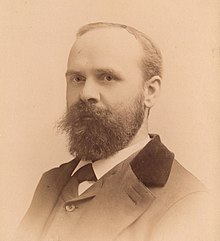
Back بنجامين تاكر Arabic بنجامين تاكر ARZ Benjamin Tucker AST بنجامین تاکر AZB Бенджамин Тъкър Bulgarian Benjamin Tucker Catalan Benjamin Tucker Czech Benjamin Tucker German Benjamin Tucker Esperanto Benjamin Tucker Spanish
Benjamin Tucker | |
|---|---|
 | |
| Born | Benjamin Ricketson Tucker April 17, 1854 South Dartmouth, Massachusetts, United States |
| Died | June 22, 1939 (aged 85) |
| Occupation(s) | Editor, publisher, writer |
| Era | Modern philosophy |
| Region | Western philosophy |
| School | Individualist anarchism Libertarian socialism Mutualism |
Main interests | Politics, economics |
| Signature | |
| This article is part of a series on |
| Anarchism in the United States |
|---|
Benjamin Ricketson Tucker (/ˈtʌkər/; 1854–1939) was an American individualist anarchist and self-identified socialist.[1] Tucker was the editor and publisher of the American individualist anarchist periodical Liberty (1881–1908). Tucker described his form of anarchism as "consistent Manchesterism" and "unterrified Jeffersonianism".[2]
Tucker looked upon anarchism as a part of the broader socialist movement. Tucker harshly opposed state socialism and was a supporter of free-market socialism[3] and libertarian socialism[4] which he termed anarchist or anarchistic socialism.[5] He connected the classical economics of Adam Smith and the Ricardian socialists as well as that of Josiah Warren, Karl Marx and Pierre-Joseph Proudhon to socialism.[6] Some modern commentators have described Tucker as an anarcho-capitalist,[7][8] although this has been disputed by others.[9][10] During his lifetime, Tucker opposed capitalism[11] and considered himself a socialist due to his belief in the labor theory of value and disputed many of the dictionary definitions of the term which he believed were inaccurate.[12]
- ^ Chartier, Gary. Anarchy and Legal Order. Cambridge University Press: New York. 2013. pp. 397. “Similarly, Benjamin Tucker, who explicitly identified himself as a socialist…”
- ^ McCarthy, Daniel (January 1, 2010) A Fistful of Dynamite Archived 2011-05-18 at the Wayback Machine, The American Conservative.
- ^ Chartier, Gary; Johnson, Charles W. Markets Not Capitalism: Individualist Anarchism Against Bosses, Inequality, Corporate Power, and Structural Poverty. Brooklyn: Minor Compositions/Autonomedia. (2011). pp 10. “…In ‘State Socialism and Anarchism,’ Benjamin Tucker explains why a market-oriented variety of anarchism can be understood as part of the socialist tradition…”
- ^ Chartier, Gary; Johnson, Charles W. Markets Not Capitalism: Individualist Anarchism Against Bosses, Inequality, Corporate Power, and Structural Poverty. Brooklyn: Minor Compositions/Autonomedia. (2011). pp 33. “…’There are two Socialisms…One is dictatorial, the other libertarian.”
- ^ Chartier, Gary. Anarchy and Legal Order. Cambridge University Press: New York. 2013. pp. 399.
- ^ Chartier, Gary. Anarchy and Legal Order. Cambridge University Press: New York. 2013. pp. 401.
- ^ Freeden, Michael; Sargent, Lyman Tower; Stears, Marc (2013-08-15). The Oxford Handbook of Political Ideologies. Oxford: Oxford University Press. p. 388. ISBN 978-0-19-958597-7.
- ^ Curran, G. (2006-10-31). 21st Century Dissent: Anarchism, Anti-Globalization and Environmentalism. Springer. p. 21. ISBN 978-0-230-80084-7.
- ^ McKay, Iain. An Anarchist FAQ. AK Press. Oakland. 2008. pp 23, 526.
- ^ Chartier, Gary. Anarchy and Legal Order. Cambridge University Press: New York. 2013. pp. 402-403.
- ^ Chartier, Gary. Anarchy and Legal Order. Cambridge University Press: New York. 2013. pp. 403.
- ^ Chartier, Gary. Anarchy and Legal Order. Cambridge University Press: New York. 2013. pp. 400 fn 32.
© MMXXIII Rich X Search. We shall prevail. All rights reserved. Rich X Search